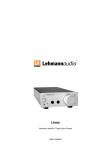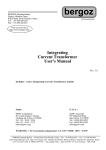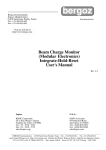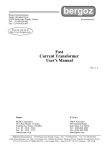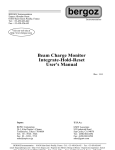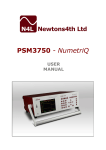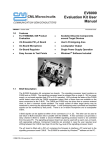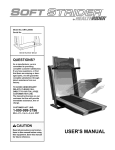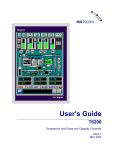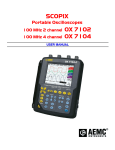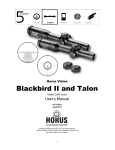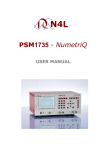Download S-band Beam Position Monitor User`s Manual
Transcript
Bergoz Instrumentation Espace Allondon Ouest 01630 Saint Genis Pouilly, France Tel. : +33-450.426.642 Fax : +33-450.426.643 S-band Beam Position Monitor User’s Manual Rev. 2.4 Includes Processing modes: Auxiliary options: Accessories: Sample & Hold Track & Hold Track-Continuous Beam Trigger, built-in Sum-of-log Output Direct log (A,B,C,D) outputs Filter/amplifier Front-end Japan: U.S.A.: REPIC Corporation 28-3, Kita Otsuka 1-Chome Toshima-ku, Tokyo 170-0004 Tel.: 03 - 3918 - 5326 Fax: 03 - 3918 - 5712 GMW Associates 955 Industrial Road San Carlos, CA 94070 Tel.: (650) 802-8292 Fax: (650) 802-8298 BERGOZ Instrumentation - 01630 Saint Genis Pouilly, France - Tel.: +33-450.426.642 - Fax: +33-450.426.643 [email protected] - http://www.bergoz.com - Registre des Métiers: Bourg-en-Bresse - Registre des ingénieurs: Zurich TVA-VAT-IVA-USt. Nº FR88414997130 - Sàrl. capital 152K€ - Siren 414 997 130 R.C.S. Bourg - APE 2651B Record of updates Version Release date 1.0 December 8, 2008 Initial version derived from LR-BPM User’s Manual v. 2.2.1 S-BPM 111.3.1 1.1 January 16, 2009 Layout change 1.3 February 18, 2010 Layout change S-BPM CONNECTORS PINS ALLOCATION change 1.4 March 09, 2010 T&H ; S&H Timing change T&H ; S&H graphs added p. 44 TRG.IN.AUX negative edge correction p. xx Pin AlloCATION correction DB9, 9 => TRG.ADC.OUT 2.0 April 01, 2011. S-BPM new release: 111.3.2. Main changes: S-BPM layout change (switch positions) Track Continuous reptition rate up to 10MHz instead of 5MHz Sample & Hold 400ns processing time instead of 470ns Sample & Hold repetition rate 5KHz instead of 2MHz due to trigger inhibition SUMOUT positive value instead of negative TRG.AUX.IN on rising edge > 0.4V instead of negative > 2V Ortho. / Rot. jumpers positions as LR-BPM Track Continuous traces Track & Hold and Sample & Hold traces Resolution improvements CONNECTORS PINS ALLOCATION Rev. 1.2 (TRG.ADC.OUT DB9 pin5) 2.1 April 26, 2011 p.43 "Agreement on axes & signs", schematics and annotations corrections. 2.2 May 23, 2011 Correction T / T&H S&H mode switch position p.12, 13 & 15. 2.3 March 12, 2012 Reaction Time to Beam Position Change p.28 => updated 2.4 November 07, 2013 CONNECTORS PINS ALLOCATION Rev. 1.3 (errors correction) BERGOZ Instrumentation 01630 Saint Genis Pouilly, France [email protected] Page 1 S-band Beam Position Monitor Version 2.4 User’s manual SUMMARY INITIAL INSPECTION, WARRANTY, ASSISTANCE......................................................................................2 YOU JUST RECEIVED A BEAM POSITION MONITOR ................................................................................3 Determine which S-BPM model you received.....................................................................................5 Determine which options are installed onto S-BPM............................................................................5 MODES OF OPERATION FOR VARIOUS BEAMS..........................................................................................7 Track-Continuous (T) Mode.................................................................................................................7 Sample & Hold (S&H) Mode...............................................................................................................8 Track & Hold (T&H) Mode.................................................................................................................8 Triggering.............................................................................................................................................9 Switching between modes....................................................................................................................9 OPTIONS............................................................................................................................................................10 Built-in Beam Trigger “S-BPM-TRG” option...................................................................................10 Sum of logs Output “S-BPM-SUM” option.......................................................................................10 Direct log outputs for A, B, C and D “S-BPM-ABCD” option.........................................................10 ACCESS to JUMPERS and SWITCHES............................................................................................................11 TRACK-CONTINUOUS MODE.......................................................................................................................12 TRACK and HOLD MODE................................................................................................................................13 TRACK & HOLD MODE (Con't)......................................................................................................................14 SAMPLE & HOLD MODE................................................................................................................................15 CHANGING PICKUP CONFIGURATION.......................................................................................................17 Orthogonal pickups, position of jumpers...........................................................................................17 Rotated pickups, position of jumpers.................................................................................................17 QUICK CHECK: S-BPM in Track-Continuous Mode.......................................................................................18 For CW beams....................................................................................................................................18 Beam displacement.............................................................................................................................20 Dynamic range....................................................................................................................................20 For macropulse beam.........................................................................................................................21 Simulating beam position changes.....................................................................................................23 Resolution...........................................................................................................................................25 Dynamic range....................................................................................................................................26 Reaction Time to Beam Position Change...........................................................................................28 QUICK CHECK: S-BPM in Sample&Hold Mode.............................................................................................29 For macropulse beam.........................................................................................................................29 Timing for macropulse beam..............................................................................................................33 Resolution...........................................................................................................................................35 For single pulse beam.........................................................................................................................36 Simulating beam position changes.....................................................................................................40 S-BPM PRINCIPLE OF OPERATION...............................................................................................................42 BLOCK DIAGRAM...........................................................................................................................................42 AGREEMENT ON AXES & SIGNS..................................................................................................................43 SIGNALS............................................................................................................................................................44 S-BPM CONNECTORS PINS ALLOCATION Rev. 1.3...................................................................................46 BPM CABLES LAYOUT INSTALLATION......................................................................................................47 Cable layout........................................................................................................................................47 ACCESSORIES..................................................................................................................................................48 Font-End Filter/Amplifier (S-FEFA)..................................................................................................48 Table-top test kit (BPM-KIT).............................................................................................................48 Card Extender BPM-XTD.................................................................................................................49 Power Supply module.........................................................................................................................50 BPM Chassis BPM-RFC/X................................................................................................................50 SCHEMATICS & BOARD LAYOUT................................................................................................................52 ACKNOWLEDGEMENTS................................................................................................................................52 BERGOZ Instrumentation 01630 Saint Genis Pouilly, France [email protected] Page 2 S-band Beam Position Monitor Version 2.4 User’s manual INITIAL INSPECTION, WARRANTY, ASSISTANCE INITIAL INSPECTION It is recommended that the shipment be inspected immediately upon delivery. If it is damaged in any way, contact Bergoz Instrumentation or your distributor. The content of the shipment should be compared to the items listed on the invoice. Any discrepancy should be notified to Bergoz Instrumentation or its distributor immediately. Unless promptly notified, Bergoz Instrumentation will not be responsible for such discrepancies. WARRANTY Bergoz Instrumentation warrants its beam monitors to operate within specifications under normal use for a period of 12 months from the date of shipment. Spares, repairs and replacement parts are warranted for 90 days. Products not manufactured by Bergoz Instrumentation are covered solely by the warranty of the original manufacturer. In exercising this warranty, Bergoz Instrumentation will repair, or at its option, replace any product returned to Bergoz Instrumentation or its distributor within the warranty period, provided that the warrantor’s examination discloses that the product is defective due to workmanship or materials and that the defect has not been caused by misuse, neglect, accident or abnormal conditions or operations. Damages caused by ionizing radiations are specifically excluded from the warranty. Bergoz Instrumentation and its local distributors shall not be responsible for any consequential, incidental or special damages. ASSISTANCE Assistance in installation, use or calibration of Bergoz Instrumentation beam monitors is available from Bergoz Instrumentation, 01630 Saint Genis Pouilly, France. It is recommended to send a detailed description of the problem by e-mail. SERVICE PROCEDURE Products requiring maintenance should be returned to Bergoz Instrumentation or its distributor. Bergoz Instrumentation will repair or replace any product under warranty at no charge. The purchaser is only responsible for transportation charges. For products in need of repair after the warranty period, the customer must provide a purchase order before repairs can be initiated. Bergoz Instrumentation can issue fixed price quotations for most repairs. However, depending on the damage, it may be necessary to return the equipment to Bergoz Instrumentation to assess the cost of repair. RETURN PROCEDURE All products returned for repair should include a detailed description of the defect or failure and name of the user. Contact Bergoz Instrumentation or your local distributor to determine where to return the product. Returns must be notified by e-mail prior to shipment. Return should be made prepaid. Bergoz Instrumentation will not accept freight-collect shipment. Shipment should be made via United Parcel Service, DHL or Federal Express. Within Europe, the transportation service offered by the Post Offices “EMS” (Chronopost, Datapost, etc.) can be used. The delivery charges or customs clearance charges arising from the use of other carriers will be charged to the customer. BERGOZ Instrumentation 01630 Saint Genis Pouilly, France [email protected] S-band Beam Position Monitor Version 2.4 User’s manual Page 3 YOU JUST RECEIVED A BEAM POSITION MONITOR .... This manual applies to the S-band BPM only: S-BPM 111.3.2 Other models, e.g. BPM, MX-BPM, LR-BPM, VF-BPM, BB-BPM, BPM-AFE are described in other manuals. The S-band BPM system includes: Description Order code • • • • • S-BPM/X.XXXGHz S-BPM-SH S-BPM-TRG S-BPM-SUM S-BPM-ABCD S-band BPM electronics module Sample & Hold on X and Y, option Beam Trigger, option Sum of logs, option Direct A,B,C,D wideband outputs, option The options are factory-installed onto the S-BPM electronics module. Accessories • Filter/Amplifer Front-end (1 channel) • 19” chassis with power supply • Table-top test kit • 3U-Card extender with coaxial contacts • RF service module with four front-panel BNC S-FEFA/X.XXXGHz BPM-RFC/X, X = number of BPM stations BPM-KIT BPM-XTD BPM-SERV/RF BERGOZ Instrumentation 01630 Saint Genis Pouilly, France [email protected] Page 4 S-band Beam Position Monitor Version 2.4 User’s manual YOU JUST RECEIVED A BEAM POSITION MONITOR .... Check that the Table-top Kit power supply voltage corresponds to your mains voltage. On some table-top kit BPM-KIT older models, an AC/DC power supply block is installed. Its AC input voltage range is indicated on the power supply block. If it does not correspond to your AC mains, use a transformer or contact the manufacturer to get another power supply. In the 19” chassis BPM-RFC: The power supply is autoranging from 98V…264V. Check the fuse configuration, that it corresponds to your national regulations. The table-top test kit does not have any fuse. The 19” BPM-RFC chassis fuse compartment is configured at the time of shipment according to its destination: • North America: mains ground wire unfused. • All other destinations: both mains wires are fused. To verify which fuse configuration is installed on your chassis, pull out the removable fuse block, using a small screwdriver. • The unfused ground configuration has a shorting bar and a 2A 6x32 fuse. • The configuration with both AC lines fused is equipped with two 2A 5x20 fuses. To change this configuration, unscrew the fuse holder off the fuse block, flip the holder over and screw it back onto the fuse block. Insert the following fuses: • For unfused ground configuration: one 2A 6x32 fast fuse. • For both AC lines fused configuration: two 2A 5x20 fast fuses. BERGOZ Instrumentation 01630 Saint Genis Pouilly, France [email protected] Page 5 S-band Beam Position Monitor Version 2.4 User’s manual YOU JUST RECEIVED A BEAM POSITION MONITOR .... Determine which S-BPM model you received At the time of writing this User’s Manual, only one version has been shipped to users: S-BPM revision number 111.3.2 The circuit revision number 111.3.2 is engraved on the printed circuit board. Determine which options are installed onto S-BPM S-BPM with option Sample & Hold i.e. S-BPM-SH can be recognized by: • The printed circuit is equipped with Track&Hold + Sample&Hold circuits: To remove the shield cover, refer to Chapter ACCESS TO JUMPERS and SWITCHES. Track & Hold + Sample & Hold circuits BERGOZ Instrumentation 01630 Saint Genis Pouilly, France [email protected] Page 6 S-band Beam Position Monitor Version 2.4 User’s manual YOU JUST RECEIVED A BEAM POSITION MONITOR .... Determine which options are installed (Cont’d) Buit-in trigger circuit S-BPM with Built-in Trigger option S-BPM-TRG can be recognized by: • The printed circuit board is equipped with a built-in trigger circuit: S-BPM with A,B,C and D direct outputs option S-BPM-ABCD can be recognized • The printed circuit board is equipped with A, B, C and D output connectors Direct output connectors for Channels A, B, C, D LOGA LOGB LOGC LOGD BERGOZ Instrumentation 01630 Saint Genis Pouilly, France [email protected] Page 7 S-band Beam Position Monitor Version 2.4 User’s manual MODES OF OPERATION FOR VARIOUS BEAMS S-BPM can be equipped with many options, then further configured by the user to support many modes of operation: Track-Continuous (T) Mode Does not require Sample & Hold option Does not require Built-in Beam Trigger option Output bandwidth DC to 10 MHz T-mode is indicated whenever fast beam motion must be observed: • CW beams in general • Linacs and synchrotrons with bunch repetition rate up to 3 GHz • Betatron oscillation monitoring in boosters and storage rings • Cyclotrons, microtrons • Ion and proton synchrotrons with ƒrev > 1 MHz Note : Track & Hold can also be used up to 5 MHz frev. Macropule beams: • Linacs with micropulse RF structure up to 3 GHz • Transfer lines with micropulse RF structure up to 3 GHz • Cyclotrons, microtrons The Track Continuous mode is NOT suitable for single bunch beams, i.e. Beams of short pulses at low repetition rate. E.g. pulses at 10 Hz repetition rate. To measure these beams, the Sample & Hold mode must be used. Refer to “Sample & Hold Mode” chapter p.15 for switch settings. BERGOZ Instrumentation 01630 Saint Genis Pouilly, France [email protected] Page 8 S-band Beam Position Monitor Version 2.4 User’s manual MODES OF OPERATION FOR VARIOUS BEAMS (Cont’d) Sample & Hold (S&H) Mode Requires Sample&Hold option S-BPM-SH to be mounted on the printed circuit board Processing time Hold time ADC measurement time Repetition rate ~ 400 ns Up to 100 ms. At maximum repetion rate, at least 100 ns “good signal”. Limited to 5kHz by on-board trigger inhibition. Note that T&H Mode can be used, up to 5 MHz, when the pulse or macropulse repetition rate is higher than 1 MHz. Linacs: single bunch, macropulses, bunch trains Transfer lines: single bunch, macropulses, bunch trains Synchrotron first turn Synchrotron single bunch turn-by-turn Synchrotron multi-single bunch turn-by-turn, using trigger gate. Refer to “Sample & Hold Mode” chapter p.15 for switch settings Track & Hold (T&H) Mode Requires Sample&Hold option S-BPM-SH to be mounted on the printed circuit board Processing time Hold time ADC measurement time Repetition rate ~ 60 ns ~ 70 ns At maximum repetion rate, at least 50 ns “good” signal Up to 5 MHz Indicated whenever the single pulse or macropulse repetition rate is faster than 2 MHz. Note that T&H Mode cannot be used when the pulse or macropulse repetition rate is higher than 5 MHz. Indicated for: Linacs, Synchrotron ƒrev < 5 MHz, Single bunch turn-by-turn Synchrotron multi-single bunch turn-by-turn, using trigger gate. Refer to " Track & Hold Mode” chapter p.13 for switch settings BERGOZ Instrumentation 01630 Saint Genis Pouilly, France [email protected] Page 9 S-band Beam Position Monitor Version 2.4 User’s manual MODES OF OPERATION FOR VARIOUS BEAMS (Cont’d) Triggering In Sample&Hold (S&H) and Track&Hold (T&H) modes, S-BPM must be triggered. Triggering can be provided: a) by the built-in Beam Trigger, if installed on S-BPM (order code S-BPM-TRG). To use the built-in Beam Trigger, it must be enabled by its switch. See built-in Beam Trigger switch p.12. b) by an external signal applied to TRG.IN.AUX input. To use the external trigger, the built-in trigger –if installed– must be disabled. See built-in Beam Trigger switch p.12. Switching between modes In principle, the Mode of Operation is set by the on-board switches, permanently. Yet, it is possible during operation, to switch to Track-Continuous Mode to ease the timing adjustment of an external trigger. The control line TRACK-CONTINUOUS (pull down) is available on the front panel DB9 pin 7. BERGOZ Instrumentation 01630 Saint Genis Pouilly, France [email protected] Page 10 S-band Beam Position Monitor Version 2.4 User’s manual OPTIONS In addition to the Sample & Hold option described in the preceeding chapter, other options are available: Built-in Beam Trigger “S-BPM-TRG” option Requires Built-in Beam Trigger option S-BPM-TRG to be mounted on the printed circuit board Particle polarity Minimum detected charge Maximum repetition rate S-BPM operates with positive and negative particle polarity 100 pC bunch seen by four pickups of 5 pF capacitance and width = 1/8 of circumference. 5 MHz. Sum of logs Output “S-BPM-SUM” option Requires Sum-of-Logs option S-BPM-SUM to be mounted on the printed circuit board Value Bandwidth SUM = +[Lg(A) + Lg(B) + Lg(C) + Lg(D)] 10 MHz Note: When the beam is on center of the BPM pickup, Lg(A) = Lg(B) = Lg(C) = Lg(D), thus SUM is proportional to +Lg(beam current). Direct log outputs for A, B, C and D “S-BPM-ABCD” option Requires Direct A,B,C,D Outputs option S-BPM-ABCD to be mounted on the printed circuit board Outputs Bandwidth Connectors Log(A), Log(B), Log(C) and Log(D) 10 MHz 1.0/2.3 output connectors Note: Mating connectors are not installed in chassis BPM-RFC or BPM-KIT. Users of option S-BPM-ABCD must provide these connectors. Refer to “BPM MODULE REAR CONNECTOR”. See typical Lg(A) output from a single bunch on preceeding page timing diagram. Note: Accessories are described in chapter p.48 “ACCESSORIES”. BERGOZ Instrumentation 01630 Saint Genis Pouilly, France [email protected] Page 11 S-band Beam Position Monitor Version 2.4 User’s manual ACCESS to JUMPERS and SWITCHES To access jumpers and switches, remove the module shield: S-BPM modules can be inserted/removed from their chassis or BPM-KIT while the power is ON. The S-BPM module is equipped with many on-board potentiometers to adjust the log amplifiers gain, slope and intercept point. They require precise instruments, tools and procedures for their adjustment. BERGOZ Instrumentation 01630 Saint Genis Pouilly, France [email protected] S-band Beam Position Monitor Version 2.4 User’s manual Page 12 TRACK-CONTINUOUS MODE Set switches to: Mode: Track-Continuous (T) => DOWN Processing: Track-Continuous (T) => UP Timing: Inactive Built-in Beam Trigger: not available in this mode TRG.ADC.OUT Edge : not available in this mode Active switch Inactive switch Built-in Beam Trigger UP / DOWN Enabled / Disabled Processing UP T&H or T DOWN S&H TRG.ADC.OUT Edge Mode In S&H Mode : UP / DOWN Negative / Positive In T&H Mode : UP / DOWN Positive / Negative UP : T Timing UP / DOWN T&H / S&H DOWN : S&H or T&H Output signals XOUT and YOUT track the position given by A, B, C and D inputs with DC to 10 MHz bandwidth. BERGOZ Instrumentation 01630 Saint Genis Pouilly, France [email protected] Page 13 S-band Beam Position Monitor Version 2.4 User’s manual TRACK and HOLD MODE Set switches to: Mode: T&H => UP Processing: T&H => UP Timing Hold Clock: T&H => UP Timing Trigger: Inhibition Trigger to avoid bad trigger during processing. 200ns in T&H mode => UP Built-in Beam Trigger as desired. Disable for external trigger. ADC Trigger Output Edge as desired Active switch Inactive switch Built-in Beam Trigger UP / DOWN Enabled / Disabled Processing UP T&H or T DOWN S&H TRG.ADC.OUT Edge In S&H Mode : UP / DOWN Negative / Positive In T&H Mode : UP / DOWN Positive / Negative Mode Timing Hold Clock UP / DOWN T&H / S&H UP : T DOWN : S&H or T&H BERGOZ Instrumentation 01630 Saint Genis Pouilly, France [email protected] Page 14 S-band Beam Position Monitor Version 2.4 User’s manual TRACK & HOLD MODE (Con't) In Track & Hold Mode, the output signals timing looks like this: 3GHz input macropule TRG.ADC.OUT for Oscilloscope triggering (on falling edge) ~70 ns “Good” XOUT and YOUT signals XOUT Output signals XOUTand YOUT track the position given by A, B, C and D inputs with 5 MHz bandwidth. With 5MHz macropulse repetition rate, the output signals looks like this : 5 MHz repetition rate 200 ns 3GHz input macropule TRG.ADC.OUT for oscilloscope triggering (on falling edge) XOUT BERGOZ Instrumentation 01630 Saint Genis Pouilly, France [email protected] Page 15 S-band Beam Position Monitor Version 2.4 User’s manual SAMPLE & HOLD MODE Set switches to: Mode: Sample&Hold => UP Processing: Sample&Hold => DOWN Timing Hold Clock: Sample&Hold => DOWN Timing Trigger: Inhibition Trigger to avoid bad trigger during processing. 200us in S&H mode => DOWN Built-in Beam Trigger: As desired ADC Trigger Output Edge: As desired Active switch Inactive switch Built-in Beam Trigger UP / DOWN Enabled / Disabled Processing UP T&H or T DOWN S&H TRG.ADC.OUT Edge In S&H Mode : UP / DOWN Negative / Positive In T&H Mode : UP / DOWN Positive / Negative Mode Timing Hold Clock UP / DOWN T&H / S&H UP : T DOWN : S&H or T&H BERGOZ Instrumentation 01630 Saint Genis Pouilly, France [email protected] Page 16 S-band Beam Position Monitor Version 2.4 User’s manual SAMPLE & HOLD MODE (Cont’d) In Sample & Hold Mode, the output signals timing looks like this: 3GHz input macropule TRG.ADC.OUT for oscilloscope triggering From TRG.ADC.OUT trailing edge, XOUT is good to be read by ADC XOUT Good value on XOUT ~400ns Trailing edge of TRG.ADC.OUT occurs about 400ns from the time when TRG.IN.AUX was applied to S-BPM. XOUT (and YOUT) are good to read by ADC at the time of TRG.ADC.OUT trailing edge. Note that TRG.ADC.OUT polarity can be inverted. The timing is explained in more details in QUICK CHECK: S-BPM in Sample & Hold Mode: Timing for macropulse beam p.33 BERGOZ Instrumentation 01630 Saint Genis Pouilly, France [email protected] Page 17 S-band Beam Position Monitor Version 2.4 User’s manual CHANGING PICKUP CONFIGURATION The pickup configuration is set with two jumpers. To change the configuration from “Rotated” to “Orthogonal” or vice versa, change the jumper position: Orthogonal pickups, position of jumpers Jumpers position for “Orthogonal” pickups Rotated pickups, position of jumpers Jumpers position for “Rotated” pickups BERGOZ Instrumentation 01630 Saint Genis Pouilly, France [email protected] Page 18 S-band Beam Position Monitor Version 2.4 User’s manual QUICK CHECK: S-BPM in Track-Continuous Mode Track-Continuous mode can be used on CW beam or macropulse (burst) mode. A Quick Check is described for both modes, successively. For CW beams If you wish to use an S-BPM (whether or not it has the Sample & Hold option S-BPM-SH), its switches must be set according to chapter TRACK-CONTINUOUS MODE. Unless otherwise specified, S-BPM without Sample&Hold S-BPM-SH option has following ex-factory settings: • • • • Orthogonal pickups Mode: Track-Continuous Built-in trigger: Disabled ADC Trigger output: positive edge Setup, to check immediately that your S-BPM system is working. If you have the table-top test kit (BPM-KIT), use the following set-up: If you have a 19” chassis (BPM-RFC/X), use the following set-up: BERGOZ Instrumentation 01630 Saint Genis Pouilly, France [email protected] Page 19 S-band Beam Position Monitor Version 2.4 User’s manual QUICK CHECK: Track-Continuous Mode for CW beam (Cont’d) To display X and Y signals, use an oscilloscope. Attach the equipment together as shown above. Oscilloscope setup: Time base 1 us/div. CH1 0.2 V/div. CH2 0.2 V/div. Trigger: free running DC-1 Mohm XOUT DC-1 Mohm YOUT Set the RF source to the S-BPM operating frequency. E.g. Set to 2856 MHz to test S-BPM/2856MHz. Amplitude about -20 dBm Please note that signals applied to S-FEFA inputs will be attenuated by the 4-way splitter: Inductive-type 4-way splitters typically attenuate by 7dB, 4-way resistive splitters, or cascaded 2-way splitters attenuate by 12dB. Connect Test Kit to DC supply or BPM-RFC chassis to AC mains; the oscilloscope will display X and Y values. XOUT signal from either Front Panel DB9 pin 1 or BPM-KIT XOUT BNC YOUT signal from either Front Panel DB9 pin 1 or BPM-KIT YOUT BNC Note : XOUT and YOUT signals overlap. Observe RMS signal noise (sdev). If the RF signals applied to all four S-FEFA inputs were exactly equal, and if the S-FEFA and S-BPM modules were perfect, the XOUT and YOUT voltages would be exactly 0 Volt. This is generally not the case, X and Y will be many 10s of millivolts off. To determine how much of this offset is caused by power splitter imbalance: Instead of connecting S-FEFA “A” to power splitter output 1, connect it to output 3. Do the same for S-FEFA B and D with power splitter outputs 2 and 4. BERGOZ Instrumentation 01630 Saint Genis Pouilly, France [email protected] Page 20 S-band Beam Position Monitor Version 2.4 User’s manual QUICK CHECK: Track-Continuous Mode for CW beam (Cont’d) The next tests consists of simulating beam displacements Insert a 6-dB attenuator at any power splitter output (e.g., signal to A input) The RF source output power should be in the range -10dBm ... -35 dBm XOUT signal from either Front Panel DB9 pin 1 or BPM-KIT XOUT BNC YOUT signal from either Front Panel DB9 pin 1 or BPM-KIT YOUT BNC Note : Observe XOUT signals is shifted to above -347mV due to the 6dB attenuator in input A. Further tests can be performed: Beam displacement • Simulating beam displacements along the X or Y axes (or both) with various attenuator values. Refer to BEAM DISPLACEMENT chapter. Dynamic range The dynamic range can be tested: Simulate a higher or lower beam current by varying the RF source output power. Also refer to DYNAMIC RANGE chapter. BERGOZ Instrumentation 01630 Saint Genis Pouilly, France [email protected] Page 21 S-band Beam Position Monitor Version 2.4 User’s manual QUICK CHECK: Track-Continuous Mode For macropulse beam If the RF power source can be gated, apply a gate to the RF source to simulate macropulses. Apply the same gate signal to the oscilloscope trigger input. Setup. If you have the table-top test kit (BPM-KIT), use the following set-up: If you have a 19” chassis (BPM-RFC/X), use the following set-up: BERGOZ Instrumentation 01630 Saint Genis Pouilly, France [email protected] Page 22 S-band Beam Position Monitor Version 2.4 User’s manual QUICK CHECK: Track-Continuous Mode For macropulse beam (Cont’d) The Gate duration is set to 5 us. The gating frequency is set to 1 kHz. Try faster gating frequency: The macropulse repetition rate can be very high. The following screen shot does not show the macropulse. It shows the S-BPM output signals XOUT and YOUT. Observe high amplitude output noise on XOUT and YOUT before and after the 5-us macropulse. This high noise is caused by the amplifiers going into high gain when there is no input signal. XOUT signal from either Front Panel DB9 pin 1 or BPM-KIT XOUT BNC YOUT signal from either Front Panel DB9 pin 1 or BPM-KIT YOUT BNC Note : Observe XOUT signals is shifted to above -347mV due to the 6dB attenuator in input A. Observe high noise before and after macropulse due to amplifiers going to highest gain when there is no input. BERGOZ Instrumentation 01630 Saint Genis Pouilly, France [email protected] Page 23 S-band Beam Position Monitor Version 2.4 User’s manual QUICK CHECK: S-BPM in Track-Continuous Mode (Cont’d) Simulating beam position changes To simulate beam position changes, the input signal power is changed by 6 dB, 10 dB and 14 dB, hence simulating position changes up to 1/3 of BPM pickup radius. The S-BPM on-center sensitivity is factory-set to 55.5 mV per dB of signal difference between opposite pickups. For pickups with small subtending angle (e.g. Buttons), 6 dB corresponds to beam displacement equal to 1/6 of BPM pickup radius. As the beam goes far off center, this sensitivity becomes lower due to the algorithm X = Log (A/C). Please consider that the pickup sensitivity becomes higher as the beam goes off center, and one non-linearity tends to compensate the other. Before simulating a beam displacement, write down the XOUT and YOUT zero offsets, using four equal attenuators: Then simulate the displacement by removing an attenuator from one input and inserting it in the opposite input: A <=> C, and B <=> D. Example: Attenuator C is removed from input C, and added to input A, thus simulating a displacement of the beam towards C (stronger signal on C pickup). S-BPM modules are factory preset : • For orthogonally placed pickups: A=up, B=left, C=down, and D=right; or, • For rotated pickups: A=upper-right, B=upper-left, C=lower-left and D=lower-right. The combinations on the following table can be tried, yielding the X and Y values listed. Please note these are displacements. Take into consideration the zero offsets due to power splitter imbalance and attenuators inequality. BERGOZ Instrumentation 01630 Saint Genis Pouilly, France [email protected] S-band Beam Position Monitor Version 2.4 User’s manual Page 24 QUICK CHECK: S-BPM in Track-Continuous Mode (Cont’d) Beam displacement (Cont’d) Table of X/Y output voltage vs. input power, assuming the pickup subtending angle is infinitely small. Input Attenuators A B C D 3+3 3 0 3 A B C D 3+3 3+3 0 0 A B C D 5+5 5 0 5 A B C D 5+5 5+5 0 0 A B C D 10 + 7 10 3 10 Equivalent Displacement Orthogonal pickups Rotated pickups 1/6 of Radius towards C X = -0,245 V Y = -0,245 V X = -0,347 V Y=0V 1/6 of Radius towards C 1/6 of Radius towards D X= 0V Y = -0,490 V X = -0,347 V Y = -0,347 V 1/4 of Radius towards C X = -0,407 V Y = -0,407 V X = -0,576 V Y=0V 1/4 of Radius towards C 1/4 of Radius towards D X= 0V Y = -0,814 V X = -0,576 V Y = -0,576 V 1/3 of Radius towards C X = -0,570 V Y = -0,570 V X = -0,806 V Y= 0V Please note these are displacements. Take into consideration the zero offsets due to power splitter imbalance and attenuators inequality. Note. The above voltages are representations of the algorithms: For Orthogonal pickups: X = Kx Lg(A/C) and Y = Ky Lg(B/D) For Rotated pickups: X = Kx [Lg(A/C) – Lg(B/D)] cos(β), and Y = Ky [Lg(A/C) + Lg(B/D)] sin(β). Where: β is the tilt angle of the pickup axes. Refer to AGREEMENT on AXES and SIGNS p.43. Kx.cos(β) and Ky.sin(β) are factory-set to 1.1513 Volts Note: This value was chosen because it corresponds to a difference-over-sum ratio equal to 1 for small amplitude displacements off-center. E.g. 0.001 V for 0.005 x R. BERGOZ Instrumentation 01630 Saint Genis Pouilly, France [email protected] Page 25 S-band Beam Position Monitor Version 2.4 User’s manual QUICK CHECK: Track-Continuous Mode Resolution The noise spectrum of XOUT (or YOUT) indicates the resolution attainable by S-BPM. Connect an oscilloscope to XOUT (or YOUT). Plot in histogram mode (e.g., Lecroy SDA11000) Blue : XOUT signal from either Front Panel DB9 pin 1 or BPM-KIT XOUT BNC Yellow : XOUT Standard deviation distribution The noise is about 1.6mVrms. To translate this rms voltage noise in beam position resolution, let’s assume a 25mm vacuum chamber radius and pickup electrodes width < vacuum chamber radius. In this case, a beam displacement by 1/6 of the pickup radius equals to 347mV. Hence, in the example above, 1.6 mVrms = 24 micrometers rms. BERGOZ Instrumentation 01630 Saint Genis Pouilly, France [email protected] Page 26 S-band Beam Position Monitor Version 2.4 User’s manual QUICK CHECK: S-BPM in Track-Continuous Mode (Cont’d) Dynamic range Observe S-BPM dynamic range with a vector network analyser (VNA). The measurements hereafter require a VNA equipped with an Auxiliary DC input, usually placed at the rear. Some known models to feature such a DC auxiliary input are: Agilent 8357D, E and ES, Agilent 5071C. Setup If you have the table-top test kit (BPM-KIT), use the following set-up: If you have a 19” chassis (BPM-RFC/X), use the following set-up: BERGOZ Instrumentation 01630 Saint Genis Pouilly, France [email protected] Page 27 S-band Beam Position Monitor Version 2.4 User’s manual QUICK CHECK: S-BPM in Track-Continuous Mode (Cont’d) Dynamic range (Cont’d) Set the VNA in power sweep mode, over the widest possible range. To cover the full S-BPM dynamic range, the VNA must be capable of >50dB power sweep. Successive power sweeps may be needed if the VNA has a more limited sweep range. Perform several sweeps with various input attenuators combinations in such a way that X and Y off center linearity is tested. Explore the range from +7 dBm down to -70 dBm. Remember that 4-way inductive-type splitters absorb typically 7 dB and resistive splitters absorb 12 dB. Usefull dynamic range about 52 dB The plot above shows the dynamic range of S-BPM with 11-meter long input cables. The ¼” cables used attenuate ≈100dB/100m at 3 GHz (Huber+Suhner GX03272). A subjective evaluation would indicate a useful dynamic range of 52dB from Marker-1 to Marker-2. Operating limits with 11-meter cables: -50 dBm to 0 dBm (after adding 7dB to the markers value in consideration of the 4-way inductive splitter insertion loss). Note: -50 dBm is –approximately– the signal collected by a BPM electrode whose subtending angle is 45 degrees, passed by a 100-uA CW beam. BERGOZ Instrumentation 01630 Saint Genis Pouilly, France [email protected] Page 28 S-band Beam Position Monitor Version 2.4 User’s manual QUICK CHECK: S-BPM in Track-Continuous Mode (Cont’d) Reaction Time to Beam Position Change S-BPM can be used for fast interlock machine protection systems: Time delay from a beam position change to Output signal half-height rise is ~45 ns Output risetime is ~30 ns. Signal shown is taken from an S-BPM at 3GHz. Signal Amplitude change on input A Input signal A ~45 ns XOUT Example from Orthogonal pickups configuration. BERGOZ Instrumentation 01630 Saint Genis Pouilly, France [email protected] Page 29 S-band Beam Position Monitor Version 2.4 User’s manual QUICK CHECK: S-BPM in Sample&Hold Mode This Quick Check works only if Sample & Hold S-BPM-SH option is installed Unless otherwise specified on the Certificate of Calibration, S-BPM with Sample&Hold option has following ex-factory settings: • • • • • Orthogonal pickups Built-in Beam Trigger Mode, Timing and Processing: S&H Built-in trigger: Disabled ADC Trigger output: Positive edge. S-BPM in Sample & Hold Mode can measure macropulse beams or single pulse beam. Quick Check setups for both types of beams are given hereafter: • QUICK CHECK: Sample&Hold Mode for macropulse beam • QUICK CHECK: Sample&Hold Mode for single pulse beam. For macropulse beam Setup, to check immediately that your S-BPM system is working in Sample & Hold Mode. If you have the table-top test kit (BPM-KIT), use the following set-up: Note: The cable to TRG.IN.AUX must be same length as input cables to compensate delay. If you have a 19” chassis (BPM-RFC/X), use the set-up on next page. BERGOZ Instrumentation 01630 Saint Genis Pouilly, France [email protected] Page 30 S-band Beam Position Monitor Version 2.4 User’s manual QUICK CHECK: Sample&Hold Mode for macropulse beam (Cont’d) If you have a 19” chassis (BPM-RFC/X), use the following set-up: Set the RF source to: • Gated mode • The S-BPM operating frequency e.g. 2856 MHz • -20dBm output power Set the Gating pulse generator to: • 5 us pulse duration • Slow repetition rate, e.g. 500 Hz Note: Some oscilloscopes External trigger delay is not long enough to view the signal on the oscilloscope screen. When that is the case, add a cable delay line to delay the “Gate” of the RF source until the gated pulse is in the screen. BERGOZ Instrumentation 01630 Saint Genis Pouilly, France [email protected] Page 31 S-band Beam Position Monitor Version 2.4 User’s manual QUICK CHECK: Sample&Hold Mode for macropulse beam (Cont’d) Insert an attenuator in one of the inputs, e.g. 6 dB in Input A. Trace 1 XOUT and Trace 2 YOUT show the held X and Y positions of the macropulse: XOUT signal from either Front Panel DB9 pin 1 or BPM-KIT XOUT BNC Next macropulse starts here YOUT signal from either Front Panel DB9 pin 1 or BPM-KIT YOUT BNC Note : Observe XOUT signals is shifted to above -347mV due to the 6dB attenuator in input A. Sample & Hold occurs here BERGOZ Instrumentation 01630 Saint Genis Pouilly, France [email protected] Page 32 S-band Beam Position Monitor Version 2.4 User’s manual QUICK CHECK: Sample&Hold Mode for macropulse beam (Cont’d) XOUT signal from either Front Panel DB9 pin 1 or BPM-KIT XOUT BNC YOUT signal from either Front Panel DB9 pin 2 or BPM-KIT YOUT BNC Note : Observe the pkpk or sdev values for trace 1 and trace 2. Using the same setup, observe the same signal on a slower oscilloscope time base: The pkpk( ) value is the macropulse-to-macropulse S-BPM peak-peak noise The sdev( ) value is the macropulse-to-macropulse S-BPM rms noise or resolution. Observe sdev(1),the macropulse-to-macropulse S-BPM rms noise or resolution of XOUT: 1.8mVrms. To translate this rms voltage noise in beam position noise, let’s assume a BPM pickup aperture of 25mm and pickup electrodes subtending angle infinitely small. In this case, a beam displacement by 1/6 of the pickup radius equals to 347mV. Hence, in the example above, 1.8 mVrms = 43 micrometers rms. BERGOZ Instrumentation 01630 Saint Genis Pouilly, France [email protected] Page 33 S-band Beam Position Monitor Version 2.4 User’s manual QUICK CHECK: Sample&Hold Mode for macropulse beam (Cont’d) Timing for macropulse beam If you have the table-top test kit (BPM-KIT), use the following set-up: CH1 CH2 CH3 XOUT TRG.ADC.OUT TRG.ADC.OUT Note: The cable to TRG.IN.AUX must be same length as input cables to compensate delay. XOUT: DB15 pin5 (rear) or XOUT.AUX: DB9 pin1 (front) TRG.ADC.OUT: DB9 pin9 (front) or DB15 pin5 XYGND: DB9 pin3 or DB15 pin6/15 CH1 CH2 CH3 TRG.ADC.OUT If you have a 19” chassis (BPM-RFC/X), use the following set-up: Note: The cable to TRG.IN.AUX must be same length as input cables to compensate delay. BERGOZ Instrumentation 01630 Saint Genis Pouilly, France [email protected] Page 34 S-band Beam Position Monitor Version 2.4 User’s manual QUICK CHECK: Timing in Sample&Hold Mode for macropulse beam (Cont’d) Observe the relative timing of • CH1: input macropulse. • CH2: output trigger TRG.ADC.OUT for the ADC on rear panel DB15 or front panel DB9 pin 9. • CH3: X output XOUT. Pulse generator setup: • Gate duration 40ns • Gate frequency: Slow, e.g. 500 Hz Oscilloscope setup: Time base 100 ns/div. CH1 50 mV/div. CH2 1 V/div. CH3 100 mV/div. DC-50 ohms S-band input macropulse DC-50 ohms TRG.ADC.OUT to trigger ADC & oscilloscope DC-1 Mohm XOUT Trigger on CH2 (TRG.ADC.OUT) 3GHz input marcopulse TRG.ADC.OUT for ADC triggering From TRG.ADC.OUT trailing edge, XOUT is good to be read by ADC XOUT Good value on XOUT ~400ns Trailing edge of TRG.ADC.OUT occurs about 400ns after TRG.IN.AUX was applied to SBPM. XOUT (and YOUT) are good to read by ADC after TRG.ADC.OUT trailing edge. Note that TRG.ADC.OUT polarity can be inverted. See TRG.ADC.OUT polarity switch p.12. BERGOZ Instrumentation 01630 Saint Genis Pouilly, France [email protected] Page 35 S-band Beam Position Monitor Version 2.4 User’s manual QUICK CHECK: Sample&Hold Mode for macropulse beam (Cont’d) Resolution With same setup as above, observe the noise on XOUT (or YOUT) output: Set the oscilloscope persistence ON, say 10 seconds persistence: 3GHz input marcopulse TRG.ADC.OUT for ADC triggering XOUT Measurements window Sdev(C3) is the rms noise or resolution of XOUT measured in the measurements window, when the output signals are “good-to-read”. The trace thickness is the noise of all successive macropulses over a 10-second period. To translate this rms voltage noise in beam position resolution, let’s assume a 25mm vacuum chamber radius and pickup electrodes width < vacuum chamber radius. In this case, a beam displacement by 1/6 of the pickup radius equals to 347mV. Hence, in the example above, resolution 1.9 mVrms = 45 micrometers rms. BERGOZ Instrumentation 01630 Saint Genis Pouilly, France [email protected] Page 36 S-band Beam Position Monitor Version 2.4 User’s manual QUICK CHECK: Sample&Hold Mode (Cont'd) For single pulse beam This Quick Check works only if Sample & Hold S-BPM-SH option is installed Unless otherwise specified on the Certificate of Calibration, S-BPM with Sample&Hold option has following ex-factory settings: • • • • • Orthogonal pickups Built-in Beam Trigger Mode, Timing and Processing: S&H Built-in trigger: Disabled ADC Trigger output: Positive edge. Setup, to check your S-BPM working in Sample & Hold Mode with single pulses. If you have the table-top test kit (BPM-KIT), use the following set-up: TRG.ADC.OUT Note: The cable to TRG.IN.AUX must be same length as input cables to compensate delay. If you have a 19” chassis (BPM-RFC/X), use the set-up on next page BERGOZ Instrumentation 01630 Saint Genis Pouilly, France [email protected] Page 37 S-band Beam Position Monitor Version 2.4 User’s manual QUICK CHECK: Sample&Hold Mode for single pulse beam (Cont’d) If you have a 19” chassis (BPM-RFC/X), use the following set-up: Note: The cable to TRG.IN.AUX must be same length as input cables to compensate delay. Set the Fast Pulse Generator to: • < 160ps risetime • 50 V • Slow repetition rate, e.g. 1 kHz Please note that signals applied to S-BPM inputs are attenuated by the 4-way splitter: Inductive-type 4-way splitters typically attenuate by 7dB, 4-way resistive splitters, or cascaded 2-way splitters attenuate by 12dB. This 50V pulse, after splitting in an inductive-type 4-way splitter (-7 dB) is about equivalent to a 500-pC bunch seen by four pickups of 5 pf capacitance and subtending angle = 45 degrees. BERGOZ Instrumentation 01630 Saint Genis Pouilly, France [email protected] S-band Beam Position Monitor Version 2.4 User’s manual Page 38 QUICK CHECK: Sample&Hold Mode for single pulse beam (Cont’d) Set the oscilloscope to: Time base 100 ns/div. CH1 1 V/div. DC-50 ohms CH2 1 V/div. DC-50 ohms CH3 0.1 V/div. DC-1 Mohm CH4 0.1 V/div. DC-1 Mohm External trigger from Fast Pulse Generator. “Beam” Pulse TRG.OUT XOUT YOUT Note: Some oscilloscopes External trigger delay is not long enough to view the signal on the oscilloscope screen. When that is the case, add a cable delay line to delay the Fast Pulse output until the signals appear on the oscilloscope screen. Single Bunch TRG.ADC.OUT for oscilloscope triggering XOUT 400ns From TRG.ADC.OUT trailing edge, XOUT is good to be read by ADC YOUT From TRG.ADC.OUT trailing edge, YOUT is good to be read by ADC Trailing edge of TRG.ADC.OUT occurs about 400ns from the time when TRG.IN.AUX was applied to S-BPM. With this setup, TRG.IN.AUX is applied at the same time as the pulse. XOUT and YOUT are good to read by ADC from the time of TRG.ADC.OUT trailing edge. Note that TRG.ADC.OUT polarity can be inverted. See TRG.ADC.OUT polarity switch p.12. BERGOZ Instrumentation 01630 Saint Genis Pouilly, France [email protected] Page 39 S-band Beam Position Monitor Version 2.4 User’s manual QUICK CHECK: Sample&Hold Mode for single pulse beam (Cont’d) With same setup as above, observe the noise on XOUT and YOUT outputs: Single Pulse TRG.ADC.OUT for oscilloscope triggering XOUT YOUT Good XOUT / YOUT signals Set the oscilloscope persistence ON: Observe the XOUT and YOUT trace thickness. It is the peak-peak dispersion –or noise– of all successive pulse position measurements during the oscilloscope persistence time. On the plot above, about 20 mVpp after TRG.ADC.OUT trailing edge, when XOUT and YOUT are “good” to read. The rms noise –or resolution– is about 3.2 times lower than the peak-peak noise, i.e. 6.25mVrms. To translate this rms voltage noise in beam position resolution, let’s assume the BPM pickup aperture is 25mm and the pickup electrodes subtending angle is infinitely small. In this case, a beam displacement by 1/6 of the pickup radius equals to 347mV. Hence, in the example above, resolution 6.25 mVrms = 37.5 micrometers rms. BERGOZ Instrumentation 01630 Saint Genis Pouilly, France [email protected] Page 40 S-band Beam Position Monitor Version 2.4 User’s manual QUICK CHECK: S-BPM in Sample&Hold Mode (Cont’d) Simulating beam position changes To simulate beam position changes, the input signal power is changed by 6 dB, 10 dB and 14 dB, hence simulating position changes up to 1/3 of vacuum chamber radius. If an inductive-type 4-way splitter is used, the pulse generator output amplitude should be about 50V with risetime < 160ps. If a resistive-type pickup is used, 100V is required. The S-BPM on-center sensitivity is factory-set to 55.5 mV per dB of signal difference between opposite pickups. For pickups with small angle (e.g. Buttons), 6 dB corresponds to beam displacement equal to 1/6 of vacuum chamber radius. As the beam goes far off center, this sensitivity becomes lower due to the algorithm X = Log (A/C). Please consider that the pickup sensitivity becomes higher as the beam goes off center, and one non-linearity tends to compensate the other. Before simulating a beam displacement, start by noting the X and Y zero offsets, using four equal attenuators: Then simulate the displacement by removing an attenuator from one input and inserting it in the opposite input: A <=> C, and B <=> D. Example: Attenuator C is removed from input C, and added to input A, thus simulating a displacement of the beam towards C (stronger signal on C pickup). S-BPM modules are factory preset : • For orthogonally placed pickups: A=up, B=left, C=down, and D=right; or, • For rotated pickups: A=upper-right, B=upper-left, C=lower-left and D=lower-right. The combinations on the following table can be tried, yielding the X and Y values listed. Please note these are displacements. Take into consideration the zero offsets due to power splitter imbalance and attenuators inequality. BERGOZ Instrumentation 01630 Saint Genis Pouilly, France [email protected] S-band Beam Position Monitor Version 2.4 User’s manual Page 41 QUICK CHECK: S-BPM in Sample&Hold Mode (Cont’d) Simulating beam position changes (Cont’d) Table of X/Y output voltage vs. input power, assuming the pickup subtending angle is infinitely small. Input Attenuators A B C D 3+3 3 0 3 A B C D 3+3 3+3 0 0 A B C D 5+5 5 0 5 A B C D 5+5 5+5 0 0 A B C D 10 + 7 10 3 10 Equivalent Displacement Orthogonal pickups Rotated pickups 1/6 of Radius towards C X = -0,245 V Y = -0,245 V X = -0,347 V Y=0V 1/6 of Radius towards C 1/6 of Radius towards D X= 0V Y = -0,490 V X = -0,347 V Y = -0,347 V 1/4 of Radius towards C X = -0,407 V Y = -0,407 V X = -0,576 V Y=0V 1/4 of Radius towards C 1/4 of Radius towards D X= 0V Y = -0,814 V X = -0,576 V Y = -0,576 V 1/3 of Radius towards C X = -0,570 V Y = -0,570 V X = -0,806 V Y= 0V Please note these are displacements. Take into consideration the zero offsets due to power splitter imbalance and attenuators inequality. BERGOZ Instrumentation 01630 Saint Genis Pouilly, France [email protected] Page 42 S-band Beam Position Monitor Version 2.4 User’s manual S-BPM PRINCIPLE OF OPERATION The signals from the pickup electrodes are processed simultaneously thru four independent channels. Each channel consists of an input band-pass filter, followed by an amplification chain with logarithmic response. When a single short pulse is applied to the band-pass filter, it will oscillate at its own resonant frequency for about 250 ns, allowing enough time for the logarithmic amplifier to detect the log of its envelope. Each amplifying chain produces a signal which peak amplitude is proportional to the log of the input signal, be it a single pulse, a pulse train, or a continuous wave. Log signals from opposite pickup electrodes are deducted from one another to obtain Log(A) – Log(C) = Log(A/C) which is said to be a very faithful representation of beam displacement between two pickup electrodes. If the pickup electrodes are placed along the axes in which the beam displacement is to be measured, the displacement X = Kx Log(A/C), directly. The Kx gain is obtained by an amplifier with adjustable gain. The same goes for the Y axis. If the pickup electrodes are placed along axes rotated as compared to the beam position measurement axes, the A-C and B-D axes must be rotated to obtain the beam displacement values along X and Y. The rotation is done wideband with >5 MHz response applying the algorithm hereafter: Schematic representation of the log-ratio BPM, an original concept of Robert E. Shafer: BLOCK DIAGRAM BERGOZ Instrumentation 01630 Saint Genis Pouilly, France [email protected] S-band Beam Position Monitor Version 2.4 User’s manual Page 43 AGREEMENT ON AXES & SIGNS X, Y : User’s orthogonal axes U, V : S-BPM pickup axes AC and BD ROTATED PICKUPS ORTHOGONAL PICKUPS α α β β≠0 General case: α may be ≠ π/2 Note: S-BPM is factory-set for equal X and Y gains, i.e. α= π/2 α = π/2 β=0 U = Lg(A/C) V = Lg(B/D) Signals of positive polarity X = Kx (U-V) cos β Y = Ky (U+V) sin β U = Lg(A/C) V = Lg(B/D) Signals of positive polarity X = Kx.V Y = Ky.U For details on pickup sensitivity and log-ratio, consult: Log-ratio Signal-Processing Technique for Beam Position Monitors, Robert E. Shafer, Proceedings of the Fourth Accelerator Instrumentation Workshop, Berkeley 1992. AIP Conf. Proceedings No. 281, pages 120-128. BERGOZ Instrumentation 01630 Saint Genis Pouilly, France [email protected] Page 44 S-band Beam Position Monitor Version 2.4 User’s manual SIGNALS Input signals BUTA BUTB BUTC BUTD Pickup inputs A, B, C, and D. Impedance 50Ω. See Agreement on Axes & Signs, this manual, for pickup assignments. Output signals for ADC XOUT X displacement. Bipolar signal up to ±2V (0 Volt represents pickup center) Output impedance: 100 Ω YOUT Y displacement. Bipolar signal up to ±2V (0 Volt represents pickup center) Output impedance: 100 Ω XGND Analog ground for XOUT YGND Analog ground for YOUT SUM.OUT + (LogA + LogB + LogC + LogD) signal Signal range 0...+2V Output impedance: 100 Ω TRG.ADC.OUT Trigger for external ADC TTL pos/neg. Edge (See QUICK CHECK: Sample&Hold Mode -and- Track&Hold Mode) Output Impedance 100 Ω. SUM&TRG.GND Ground for SUM.OUT -and- TRG.ADC.OUT VPHOUT Phase angle output ±9V = ±90° RF to Phase reference angle (S-BPM with BPPM option only, not available at time of writing) Auxiliary Output Signals XOUT.AUX Same as XOUT, but 50-Ω output impedance YOUT.AUX Same as YOUT, but 50-Ω output impedance XYGND Analog ground for XOUT.AUX and YOUT.AUX BERGOZ Instrumentation 01630 Saint Genis Pouilly, France [email protected] Page 45 S-band Beam Position Monitor Version 2.4 User’s manual SIGNALS (Cont’d) External Trigger Input and Trigger Gate TRG.IN.AUX Input for external trigger 50 Ω, positive edge > 0.4 V TRG.GATE Input for gating the beam trigger TTL, High-Low-High High state inhibits Built-in Beam Trigger Low state (default state) allows Built-in Beam Trigger. SUM&TRG.GND Ground for TRG.IN.AUX -and- TRG.GATE. Optional Output Wideband Signals Note: These optional output signals are made available to compute beam position when the algorithm implemented in the S-BPM circuit, i.e. Log(A/C) is unsuitable. This can be the case of 6-button BPM pickups, or asymmetric geometry of pickup electrodes. LOGA LOGB LOGC LOGD Logarithmic representation of BUTA input. Logarithmic representation of BUTB input. Logarithmic representation of BUTC input. Logarithmic representation of BUTD input. External Controls TRACK.CONTINUOUS GND TTL signal. To set Track-Continuous mode. High state (default) sets Track&Hold mode. Pull down for Track-Continuous mode. Pullup resistor to 5V is 4K7. Ground for above signals. Common external controls Common external controls are common to all BPM modules in a BPM chassis. None are handled by S-BPM BERGOZ Instrumentation 01630 Saint Genis Pouilly, France [email protected] Page 46 S-band Beam Position Monitor Version 2.4 User’s manual S-BPM CONNECTORS PINS ALLOCATION Rev. 1.3 DB15 female connector on BPM-RFC rear panel (one connector per BPM station) DIN41612M S-BPM module rear connector DB9 female connector on S-BPM front panel INPUT SIGNALS Input A BUTA b2 * Input B BUTB b5 * Input C BUTC b8 * Input D BUTD b11 * Phase reference (BPPM option only) PHREF b22 * X output XOUT a15 8 Analog ground XGND a20 15 Y output YOUT a18 7 Analog ground YGND a17 6 Log(A.B.C.D) output SUM.OUT 5 c20 3 ADC Trigger TTL output pos/neg edge TRG.ADC.OUT 9 b20 5 X auxiliary output XOUT.AUX 1 Y auxiliary output YOUT.AUX 2 X and Y auxiliary outputs analog ground XYGND 3 * coaxial insert 1.0/2.3 type OUTPUT SIGNALS FOR ADC AUXILIARY OUTPUT SIGNALS EXTERNAL TRIGGER INPUT AND TRIGGER GATE External trigger input pos. edge TRG.IN.AUX c19 2 Trigger inhibit gate Low-High-Low ** TRG.GATE b14 10 ** Default value: High, no inhibiting SUM&TRG.GND b19 4 4 OPTIONAL OUTPUT SIGNALS Log A LOGA b22 * Log B LOGB b25 * Log C LOGC b28 * Log D LOGD b31 * * Coaxial insert 1.0/2.3 type EXTERNAL CONTROLS Reserved RESERVED 8 a13 1 Track-Continuous mode, Low TRACK.CONTINUOUS 7 GND GND a14 13 + (8...15) V +15V c13 - (8...15) V -15V c15 Common COM c14 POWER SUPPLY BERGOZ Instrumentation 01630 Saint Genis Pouilly, France [email protected] Page 47 S-band Beam Position Monitor Version 2.4 User’s manual BPM CABLES LAYOUT INSTALLATION Cable layout Cables electrical length must be equal within ±1ns. Yet, unlike most BPM electronics, the SBPM module does not require the input signals to be in phase. It tolerates any phase change, even 180°. Unnecessary intermediate connectors should be avoided. When –for practical reasons– patchpanels must be used, the cables on either side of the patch-panel should be passed through tubular ferrite cores or even better: nanocrystalline cores. The four cables pertaining to the same BPM stations must be laid side by side. Cables, BPM chassis and modules should be kept away –as much as possible– from RF equipment, klystrons, cavities. Connectors must be chosen carefully to match the cable used. Connectors manufacturers instructions must be followed meticulously. If cable layout is subcontracted, subcontractors must be informed of the extreme reliability expected from these cables. All cables with connectors must be checked before installation with a network analyzer, up to twice the operating frequency at least; i.e. Up to 6 GHz for 3 GHz operating frequency. BPM modules must be installed in an RF-shielded chassis. BERGOZ Instrumentation 01630 Saint Genis Pouilly, France [email protected] Page 48 S-band Beam Position Monitor Version 2.4 User’s manual ACCESSORIES Font-End Filter/Amplifier (S-FEFA) The Front-End Filter/Amplifier S-FEFA is tuned to the beam RF frequency. The filter is a bandpass with very high Q-factor, thus narrow bandwidth. Therefore, an S-FEFA cannot be used at another freqency than the frequency it is tuned to. Every S-FEFA is matched to one S-BPM input channel A, B, C or D. When BPM pickup cables BPM-C-XX are delivered by Bergoz Instrumentation, they are matched to a specific S-FEFA and S-BPM input channel A, B, C or D. S-FEFA is powered from the S-BPM module thru the coaxial cable. Therefore, no filter, no attenuator can be inserted in the cable from S-FEFA to S-BPM. Table-top test kit (BPM-KIT) The table-top test kit “BPM-KIT” is an accessory which can be used to test the following modules made by Bergoz Instruments: • MX-BPM multiplexed BPM, earlier called simply “BPM”. • VF-BPM multiplexed BPM for variable frequency (ramped) accelerators. • BB-BPM, Baseband BPM for medical ramped accelerators. • LR-BPM log-ratio BPM. • S-BPM, S-band BPM. BPM-KIT currently delivered must be powered by a laboratory +/- 15V power supply. Yet, older units have been delivered to users with 100 Vac, 115 Vac and 220/230 Vac mains voltage. Check AC mains voltage on power supply module before using. The BPM-KIT includes: • • • • A DIN41612M 24+8 mating connector Four coaxial cables connected to the button inputs, terminated by SMA plugs Eight BNC jacks to enter signals like triggers and view output signals. Four DIP switches to simulate external control signals. The BPM-KIT is very convenient. It allows the BPM module to be placed flat on the table. In this position, the shield can be removed, and the user has access to all switches, Jumpers, filters and potentiometers. BERGOZ Instrumentation 01630 Saint Genis Pouilly, France [email protected] Page 49 S-band Beam Position Monitor Version 2.4 User’s manual ACCESSORIES (Cont’d) Card Extender BPM-XTD The card extender allows access to the BPM module adjustments while it is connected to the chassis, thus to the readout and control system. The BPM-XTD is not as convenient as the BPM-KIT for adjustments. The coaxial connections extensions of the button signals cause an offset of the X and Y outputs when the extender is used. This is due to the difference in signal attenuation between the 4 extension cables. These differences are recorded on a label affixed to the extender. The RF Service module BPM-SERV/RF can be inserted in a BPM station of a chassis, in place of the BPM module. It brings to the front panel –on SMA jacks– the four signals applied to this BPM station by the BPM buttons. For oscilloscope and spectrum analyzer viewing of the BPM button signals. Very useful, because the RF cables at the rear of the chassis are too crowded to be disconnected. BERGOZ Instrumentation 01630 Saint Genis Pouilly, France [email protected] Page 50 S-band Beam Position Monitor Version 2.4 User’s manual ACCESSORIES (Cont’d) Power Supply module AC mains voltage Autoranging 98…132Vac and 185…265Vac Power derating No derating down to 85 Vac (at full chassis load) Output ± 15 V, unequal loading tolerant Power 75 W Efficiency 84% at 220Vac 81% at 110 Vac Inrush current limited to 10A max. Dimensions per DIN41494: 3U high, 8F wide, 160mm deep Manufacturer Delta Elektronika BV, the Netherlands Model 75 SX 15-15 BPM Chassis BPM-RFC/X The BPM-RFC/X chassis is built around a 19” Schroff rackable RF chassis. Dimensions of the bin: 3U x 84F Schroff reference: Europac Lab HF/RF #20845-283 The BPM-RFC/X is available equipped for 1 up to 16 BPM stations. X being the number of stations. BPM-RFC/X with less than 16 stations are partially equipped BPM-RFC/16. As a result, all BPM chassis are field-upgradable to the full 16-station chassis. Chassis rear view BERGOZ Instrumentation 01630 Saint Genis Pouilly, France [email protected] Page 51 ACCESSORIES (Cont’d) BPM Chassis BPM-RFC/X Outer dimensions S-band Beam Position Monitor Version 2.4 User’s manual BERGOZ Instrumentation 01630 Saint Genis Pouilly, France [email protected] Page 52 S-band Beam Position Monitor Version 2.4 User’s manual SCHEMATICS & BOARD LAYOUT Schematics and board layouts of our instruments remain the exclusive property of Bergoz Instrumentation at all times. They are protected by the copyright laws. Schematics and board layouts are not delivered with our instruments. They can be obtained at the specific request of the instrument’s user. A request should be sent by fax, worded in the following way: To: Bergoz Instrumentation From: User’s name Date:................ I am a user of instrument type xxx-xxx serial nr. Xxx,xxx,xxx,xxx, etc. Please send me one copy of the corresponding schematics and board layout. I will use it for the instrument’s maintenance only. I will make copies only for my own use. I will inform others who need these schematics that they should request them from Bergoz Instrumentation. Signed: ....................... ACKNOWLEDGEMENTS The fundamental principles of our Log-ratio BPM module were developed by Robert E. Shafer. We sincerely thank him for his considerable contribution. Our S-BPM module was developed by Sebastien Artinian, based on the earlier LR-BPM design of Alexander Kalinin. Saint Genis Pouilly, December 2008 Last revised April, 2011 S-band Beam Position Monitor User’s Manual






















































